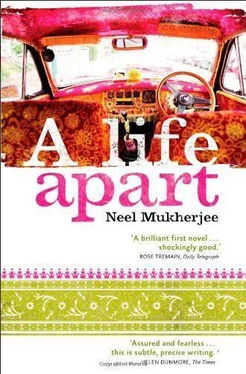‘I think she wants to hear what you think of her sweets. Or what the two of us have planned for her,’ Mr Roy Chowdhury whispers.
Miss Gilby whispers too, ‘Does she know that we know?’
Mr Roy Chowdhury raises his voice and calls out to her. Instantly, there is a sound of hasty retreat, footsteps, rustling, tinkling, all fading down to the interior of the house. Mr Roy Chowdhury and Miss Gilby fall about laughing as if they’ve been the ones caught playing children’s games.
The house, called ‘Dighi Bari’, or ‘Lake House’ — although there is no lake near it, just a big pond with dark, unfathomable water and wet, green woods ringing most of its circumference — is big, not half as big as the palace of the Nawab of Motibagh, but capacious enough for it to be recognized as a local zamindar ’s house: three storeys, painted a buttery yellow, in a regular quadrilateral shape, enclosing a large, brick-paved central courtyard. All the rooms in the house open out on to this courtyard. The rooms facing east look out on to a garden, big and rambling, which leads ultimately to a track to the village, about half a mile away: this is the designated ‘front’ of the house. Miss Gilby has her quarters in this section of the house (East Wing, she calls it) on the top storey. Mr Roy Chowdhury must have told the malee about the English love of gardens, so he has dutifully brought up dozens of pots of plants and flowers and arranged them on the verandah outside her rooms. There are canna, zinnia, dahlia, rose, even petunia and snapdragon, a couple of ficus plants, a flowering jasmine, which he has lovingly trailed around the iron railings. He comes to water the plants every morning, bows low when he sees the memsahib, so incongruous in this house, so conspicuous in this village, which has hardly ever seen a white face.
While this back verandah with the plants, which is also a running corridor linking all the rooms on that floor, looks out on to the courtyard below, she notices that half of the first floor — the two sides on the floor directly below hers — situated to the westfacing back of the house, which should open east to the courtyard, have wooden shutters and stained glass running their entire length, from the floor to the ceiling. The other side of the rooms in that ‘West Wing’ presumably has a view of the woods that nestle the dark pond that gives the house its name. This is the andarmahal , the secluded area of the house where the women live and, until recently, Bimala did too. She hasn’t been invited to see that area; it’s not that she has been told to stay off, but just that that section of the house hasn’t featured in any conversation so far. The open area of that floor is Mr Roy Chowdhury and Bimala’s quarters, while the ground floor is given over to a study, the living room, three offices, a ‘meeting room’ for conducting business, and a smaller library.
It is in the living room that Miss Gilby gives piano lessons to Bimala and conducts most of the English lessons as well. A few lessons have occasionally taken place in Miss Gilby’s study upstairs — she knows Bimala is quite curious to see how a memsahib might appoint her living space — and it is very likely that they are going to take place in that more intimate room with increasing frequency. One thing Miss Gilby knows for certain is that the passage from stilted, shy formality to an apparently easy companionship in Indian societies is swift, but whether she will be let in to that intimacy is another question. She will have to wait and see.
The first lesson is in the living room. Miss Gilby has requested Mr Roy Chowdhury not to accompany his wife to the lessons: the urge towards dependence on her husband would be too much and, consequently, learning would become a protracted business. He has thought the idea very commendable.
Very shortly after one of these lessons, as soon as Bimala departs and Miss Gilby starts to clear up a little, she notices that Bimala has left behind her exercise book, her textbooks, her pencils, everything she needs for her homework, on the table at which they have been working. She gathers them up quickly, in a swift swoop of her hands, and runs out after Bimala. She sees her bright yellow sari disappearing through a door leading to the andarmahal . In her haste, she forgets social rules, what’s out of bounds and what’s not; she rushes down the stairs, books and pencils in hand, and reaches the floor below. Across from the landing, there is a big wooden door, with coloured glass filling up the space between the top of the doorframe and the ceiling. She knocks on the door then pushes it open and enters. There are three or four low wooden chowkees on the white mosaic floor. It is much darker here than in Miss Gilby’s open verandah, but the grass-green and red panes in the glass section above the dark brown painted wooden shutters throw fuzzy gules of coloured light on the white mosaic here and there. A servant is sitting in a corner, cutting vegetables and potatoes on a bonti . Seeing Miss Gilby she gasps, shrilly, immediately draws her aanchol over her face, runs around one of the corners and disappears. Miss Gilby suddenly stops in her tracks, realizing what she has done. Before she can turn around to go, a woman appears around the corner of the verandah. She wears white, unrelieved, impeccable white cotton, draped around her in a shapeless roll; her head is shaved, her face drawn and pale, there are dark circles under her eyes. She takes one glance at Miss Gilby, shrieks and runs away. A gramophone is playing in one of the rooms, its hissy, scratchy, high-pitched sound almost totally distorting the song it plays. Or perhaps the song itself is tremulous and wobbly. It stops abruptly and, as if to time it together, Bimala makes an appearance, clearly with the maidservant and the shaven-headed woman hiding behind her, but around the corner, against the wall and invisible. Bimala too stops, as if confronted with a mirage whose truth she cannot immediately gauge.
‘I’m ssorry, Bimala,’ Miss Gilby stammers, ‘I–I just wanted to return these’ — she holds out Bimala’s books and writing materials lamely — ‘I thought how is she going to do her homework if they are left behind. .’
Bimala comes closer, looks at her with a puzzled expression; Miss Gilby is speaking too fast for her to follow anything. Her eyes alight on Miss Gilby’s outstretched hands and suddenly the quizzical expression clears. A smile floods her face.
‘Oh, my books. Thank you, Miss Gilby,’ she murmurs, taking them from her tutor’s hands.
Another woman, also dressed in stark white, but with her black hair tied severely back in plaits, appears behind Bimala. She stands staring, openmouthed, at this exchange between Bimala and an English lady right in the middle of the andarmahal . A Christian lady in the middle of the andarmahal . Bimala notices the momentary distraction in Miss Gilby’s eyes, focusing on something behind her, and wheels around.
She turns back to Miss Gilby and says, ‘My. . my. .’, searches for a word, ‘husband sister, husband sister,’ she says, at last, with triumphant relief.
‘Yes, your sister-in-law,’ Miss Gilby instinctively corrects, ‘your husband’s sister,’ stressing the possessive case. She turns and leaves with rude abruptness.
Once back in her room, she flops down on the nearest armchair and pants, as much with the knowledge of her great blunder as with the physical exertion of running up the stairs. After half an hour, she dares to go out to her verandah, eaten up with curiosity about what her presence in the andarmahal might have precipitated, although knowing well that she will not be able to see their verandah. Ten minutes of pacing up and down and straining to hear what’s going on rewards her with the sound of excited female voices and the brisk, energetic sound of broomstick against mosaic floor, the splash and swill of water, the sound of meticulous washing of the verandah into which she had mistakenly strayed.
Читать дальше












